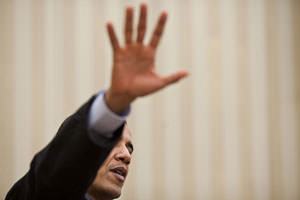Obama Gets No Credit for Courage
Presidential courage and convictions will be a strong underlying issue in Obama’s re-election campaign. Conservatives and progressives alike consider him gutless, despite evidence to the contrary.Conservatives and progressives alike consider President Obama gutless, despite evidence to the contrary.
Whether you approve of the Osama bin Laden killing, as I do, or are queasy about the act, it’s hard to argue that the president who authorized this risky mission lacked guts. It was a dramatic example of Barack Obama’s courage, but not the only one.
Presidential courage and convictions will be a strong underlying issue in Obama’s re-election campaign. Conservatives consider him gutless and weak, except when they are assailing him as being dictatorial. Progressive critics scorn him as spineless as well as a sell-out to Wall Street.
The issue of Obama’s leadership ability was thoroughly examined recently in an influential and controversial New Yorker article by the magazine’s Washington correspondent, Ryan Lizza. He dug deeply into the president’s policy in dealing with the Arab Spring uprising in Libya and elsewhere in the Mideast and North Africa. In a powerful final paragraph, he quoted an Obama adviser as describing “the president’s action in Libya as ‘leading from behind.’ ”
This phrase, a derogatory reference to Obama’s efforts to join with other nations against Libyan dictator Moammar Gadhafi, became the takeaway thought of the article. But to me, it was just plain wrong. When Navy SEALs, acting on Obama’s orders, shot and killed bin Laden in an operation that posed great risk for them and for Obama’s presidency, this was definitely not leading from behind.
Still, the criticism, coming from both conservatives and liberals, will probably continue to dog Obama as he clings to his centrist views.
Obama’s first great act of courage was when he pushed for health care reform early in his administration. As the cliché says, no good deed goes unpunished, and Obama continues to be pummeled and ridiculed for his singular achievement in sticking by health care reform, getting it passed and now implementing it, a slow and painful task.
His goals were simple and clear: assure health insurance for millions, including the working poor, and protect Americans from unjust medical policy cancellations. Presidents going back to Truman had proposed this, but none had succeeded.
Obama did, after a fight and a Republican propaganda campaign that left him and his party so weakened that the Republicans won the House and almost captured the Senate.
In doing so, he was criticized as being too involved in the details of the legislation and, at the same time, as not being involved enough. As the bill staggered through Congress and into the White House, it was difficult to know exactly what the president was doing. But since it is now law, he must have been doing something right.
In many respects, as Lizza described it, the debate within the administration over health care resembled the later discussion on how to handle the Arab Spring. On health care, the advocates of a public option or even Medicare for all fought those who argued such approaches would never pass Congress — the idealists against the realists. As popular uprisings flourished in the Middle East and North Africa, Obama wrote a five-page memorandum to Vice President Joseph Biden, Secretary of State Hillary Clinton and other members of his foreign policy team in which he was a realist and an idealist. He wrote, “… our regional and international credibility will be undermined if we are seen to be backing repressive regimes and ignoring the rights and aspirations of citizens.”
In the end, Obama, alienating Israel and Saudi Arabia, said Egyptian President Hosni Mubarak should step down immediately. “An orderly transition must be meaningful, it must be peaceful and it must begin now,” Obama said. Then, as Gadhafi began to slaughter his people, Obama had his United Nations representative, Susan Rice, introduce a resolution authorizing member states “to take all necessary measures to protect civilians under threat of attack” by the Libyan leader’s armed forces. It was passed 10-0 by the U.N. Security Council.
These were tough actions, and Obama had pursued them vigorously.
During his presidential campaign, Obama had pledged to get bin Laden. “I had said that if I ever get a shot at bin Laden we’re gonna take it,” he told Steve Kroft on “60 Minutes.” He knew the risks. “I mean you think about ‘Black Hawk Down,’ ” he said. “You think about what happened with the Iranian rescue. And it, you know, I am very sympathetic to the situation for other presidents where you make a decision, you’re making your best call, your best shot, and something goes wrong — because these are tough, complicated operations. … The day before I was thinkin’ about this quite a bit.”
Afterward, he had no regrets. “As nervous as I was about this whole process, the one thing I didn’t lose sleep over was the possibility of taking bin Laden out,” he said. “Justice was done. And I think that anyone who would question that the perpetrator of mass murder on American soil didn’t deserve what he got needs to have their head examined.”
And those who think Obama is a wimp ought to have their heads examined.
Your support matters…Independent journalism is under threat and overshadowed by heavily funded mainstream media.
You can help level the playing field. Become a member.
Your tax-deductible contribution keeps us digging beneath the headlines to give you thought-provoking, investigative reporting and analysis that unearths what's really happening- without compromise.
Give today to support our courageous, independent journalists.






You need to be a supporter to comment.
There are currently no responses to this article.
Be the first to respond.